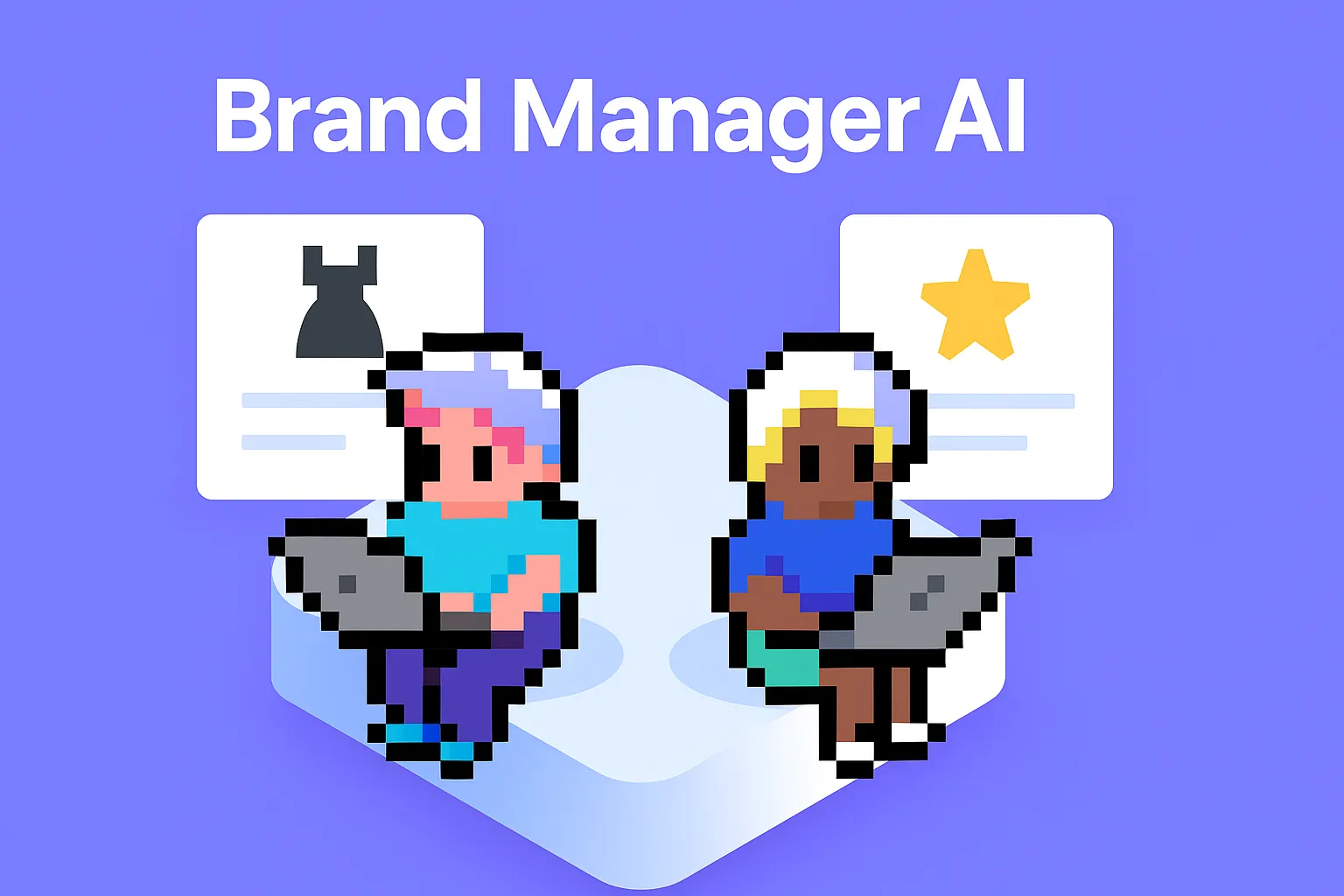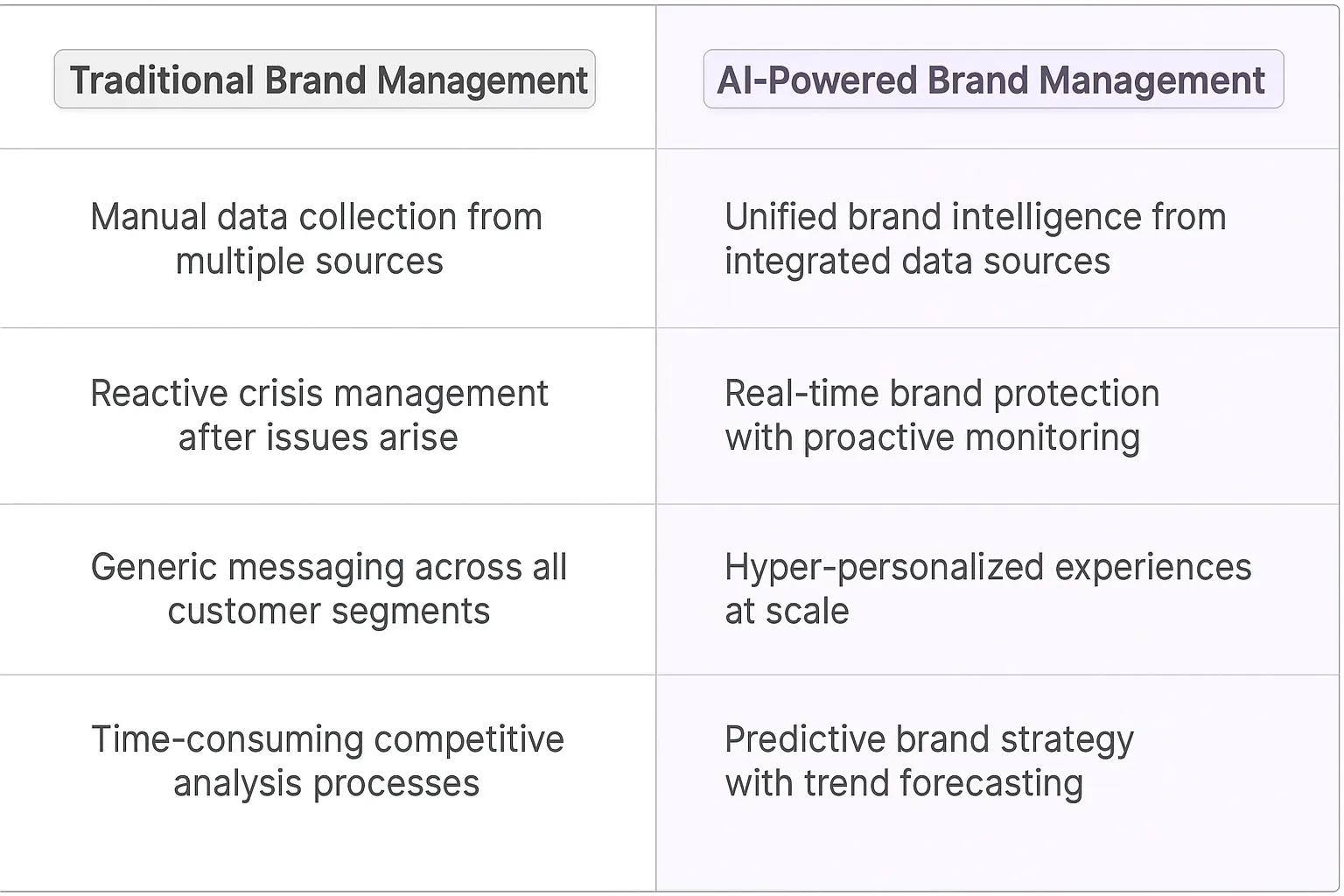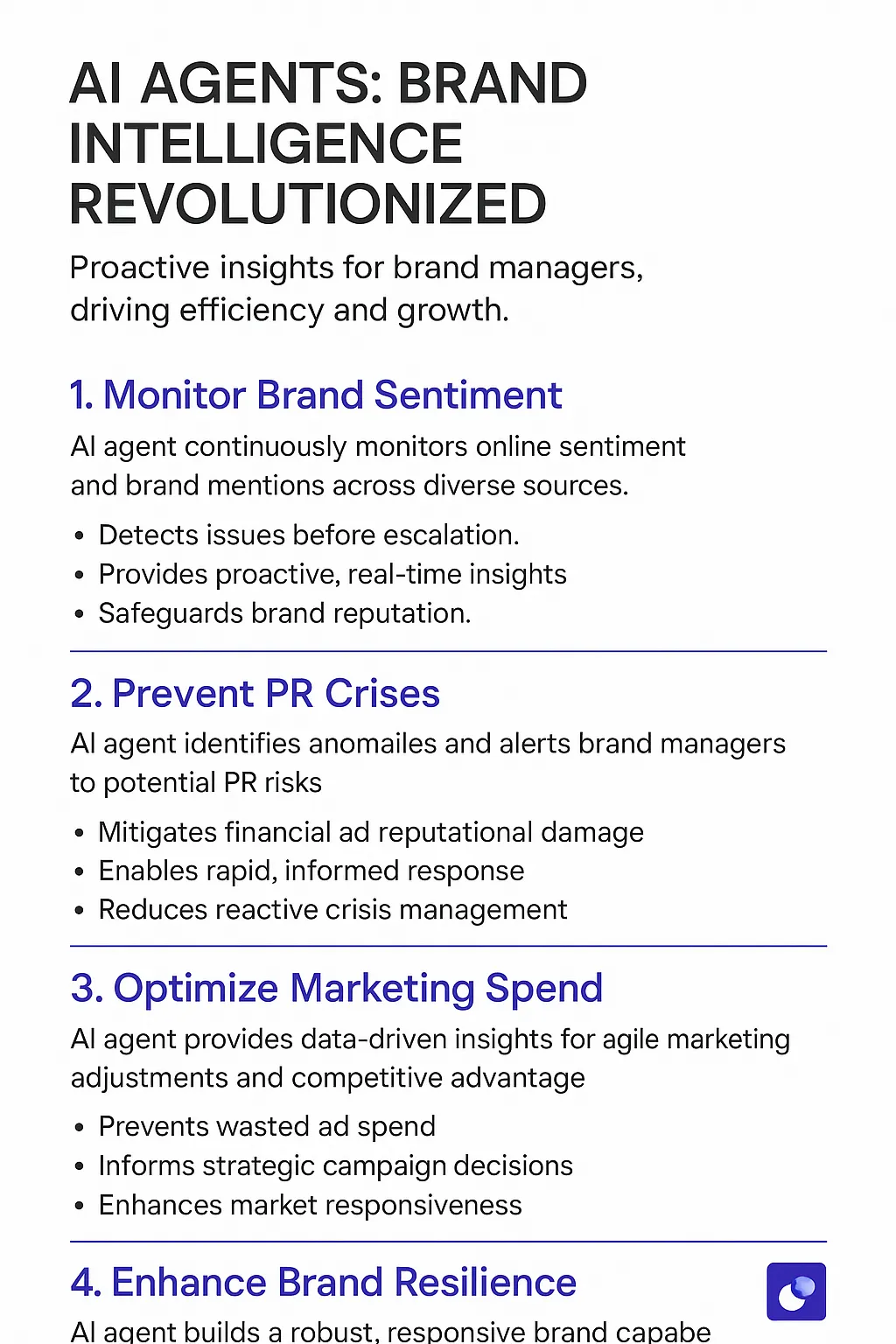A Brand Manager is a strategic professional responsible for developing, implementing, and overseeing a company's brand strategy. They work to create and maintain a strong, consistent brand identity that resonates with target audiences and differentiates the company from competitors. Brand Managers analyze market trends, consumer behavior, and competitor activities to inform brand positioning and marketing strategies. They collaborate with various departments, including marketing, product development, and sales, to ensure brand consistency across all touchpoints. Their responsibilities often include managing brand assets, coordinating marketing campaigns, overseeing product launches, and measuring brand performance through key metrics. Brand Managers play a crucial role in shaping public perception, building brand equity, and ultimately driving business growth through effective brand management.

Before AI agents entered the scene, brand managers were stuck in a world of manual processes and fragmented tools. They'd juggle spreadsheets, social media dashboards, and clunky analytics platforms. It was like trying to paint a masterpiece with a set of broken crayons.
Teams would spend hours sifting through data, piecing together insights from various sources, and struggling to maintain a consistent brand voice across channels. The result? Slow decision-making, missed opportunities, and a brand presence that often felt disjointed.
Enter AI agents for brand management - they're not just tools, they're digital teammates that transform how brands operate in the digital space. Here's why they're game-changers:
1. Unified brand intelligence: AI agents act as a central nervous system for your brand, integrating data from social media, customer feedback, market trends, and competitor analysis. They provide a holistic view that humans simply can't achieve manually.
2. Predictive brand strategy: These agents don't just analyze past data; they use machine learning to forecast future trends. They can predict which content will resonate, which markets are ripe for expansion, and how consumer sentiments might shift.
3. Real-time brand protection: AI agents monitor brand mentions and sentiment across the web in real-time. They can flag potential PR crises before they explode, allowing brands to be proactive rather than reactive.
4. Personalization at scale: By understanding individual customer preferences and behaviors, AI agents enable hyper-personalized brand experiences across touchpoints. It's like having a million brand managers, each tailoring the brand for a specific customer.
5. Creative augmentation: These agents aren't replacing human creativity; they're enhancing it. They can generate ideas for campaigns, suggest visual elements that align with brand guidelines, and even help craft brand stories that resonate with specific audience segments.
6. Efficiency on steroids: AI agents automate routine tasks like report generation, content scheduling, and basic customer inquiries. This frees up human brand managers to focus on high-level strategy and creative thinking.
7. Continuous learning and optimization: Unlike static tools, AI agents evolve. They learn from each interaction, campaign, and market shift, constantly refining their algorithms to provide more accurate insights and predictions.
The introduction of AI agents in brand management isn't just an incremental improvement - it's a paradigm shift. It's the difference between navigating with a paper map and having a real-time GPS that predicts traffic patterns and suggests the optimal route. In the attention economy, where brand relevance can change in a heartbeat, AI agents give brand managers the power to not just keep up, but to lead the pack.

Brand managers are constantly juggling multiple balls in the air, from market research to campaign planning to performance analysis. AI agents can step in as digital teammates, taking on some of the heavy lifting and allowing brand managers to focus on high-level strategy and creative thinking.
One key process where AI shines is in social media management. An AI agent can monitor brand mentions across platforms, analyze sentiment, and flag potential PR issues before they blow up. It's like having a 24/7 social media command center, but without the need for a team of bleary-eyed interns staring at screens all night.
Another process ripe for AI assistance is competitive analysis. Instead of manually tracking competitor moves, an AI agent can continuously scrape websites, social media, and news sources to build a real-time picture of the competitive landscape. This allows brand managers to spot trends and react quickly to market shifts.
When it comes to specific tasks, AI agents can be game-changers for brand managers. Take content creation, for instance. While AI won't replace human creativity, it can certainly augment it. An AI agent can generate initial drafts of social media posts, blog articles, or even ad copy based on brand guidelines and past successful content. This gives brand managers a starting point to refine and polish, rather than facing the dreaded blank page.
Data analysis is another area where AI excels. Instead of spending hours crunching numbers in spreadsheets, brand managers can task an AI agent with analyzing campaign performance data and generating insights. The AI can identify patterns and correlations that might be missed by human eyes, leading to more data-driven decision making.
Customer segmentation is a crucial task for brand managers, and AI can take it to the next level. By analyzing vast amounts of customer data - from purchase history to social media activity - an AI agent can create highly granular customer segments. This allows for hyper-personalized marketing campaigns that speak directly to each customer's needs and preferences.
Finally, AI agents can be invaluable in crisis management situations. They can monitor online chatter in real-time, assess the severity of a potential PR issue, and even suggest response strategies based on successful past crisis management efforts. This gives brand managers a head start in addressing issues before they spiral out of control.
The key to leveraging AI agents effectively is to view them as amplifiers of human creativity and strategic thinking, not replacements. By offloading routine tasks and providing data-driven insights, AI agents free up brand managers to focus on what they do best: crafting compelling brand narratives and building lasting connections with customers.

Brand Manager AI agents are reshaping how companies approach their brand strategies across diverse sectors. These digital teammates bring a unique blend of data analysis and creative content capabilities to the table, enabling businesses to craft and maintain compelling brand identities with unprecedented efficiency. Let's dive into some specific industry applications that highlight the transformative potential of AI in brand management.
From retail giants fine-tuning their market positioning to tech startups carving out their niche, AI agents are becoming indispensable allies in the brand-building process. They're not just tools; they're partners that can analyze vast amounts of consumer data, predict trends, and even generate creative content that resonates with target audiences. This shift is fundamentally altering the landscape of brand management, allowing for more dynamic, responsive, and personalized brand strategies.
As we explore these use cases, we'll see how AI agents are not replacing human creativity but amplifying it, allowing brand managers to focus on high-level strategy while AI handles the heavy lifting of data analysis and routine tasks. This symbiosis between human intuition and machine intelligence is opening up new frontiers in brand management, enabling companies to stay ahead in an increasingly competitive marketplace.
The fashion industry is notoriously fickle, with trends changing faster than you can say "last season's lookbook." Enter Brand Manager AI Agents, the digital teammates poised to give fashion houses the edge they need in this cutthroat world.
These AI-powered brand guardians are like having Anna Wintour's eye, Karl Lagerfeld's creativity, and a data scientist's brain all rolled into one. They're constantly scanning social media, runway shows, street style, and even weather patterns to predict the next big thing before it hits.
But it's not just about spotting trends. These AI agents are masters of brand consistency across all touchpoints. They ensure that whether a customer is browsing the website, scrolling through Instagram, or walking into a brick-and-mortar store, the brand's voice and aesthetic remain as cohesive as a well-curated capsule collection.
The real magic happens when these AI agents start collaborating with designers. They can generate mood boards, suggest color palettes, and even propose design tweaks based on real-time consumer feedback. It's like having a focus group that never sleeps, constantly feeding insights to keep the brand fresh and relevant.
And let's talk about influencer partnerships. Brand Manager AI Agents can identify the perfect brand ambassadors by analyzing not just follower counts, but engagement rates, audience demographics, and even the sentiment of comments. They're essentially playing matchmaker between brands and influencers, creating partnerships that feel authentic rather than forced.
The result? Fashion brands that are more responsive, more innovative, and more in tune with their customers than ever before. It's not about replacing human creativity – it's about augmenting it with data-driven insights and lightning-fast execution.
In an industry where being a step ahead can mean the difference between setting a trend and following one, Brand Manager AI Agents are giving fashion houses the tools to stay perpetually on the cutting edge. It's not just fashion – it's fashion with a digital brain.
The hotel industry is a battlefield of brands vying for guest loyalty. It's a space where a single bad review can spiral into a PR nightmare, and where personalization is no longer a luxury but a necessity. This is where Brand Manager AI Agents are checking in and changing the game.
These digital teammates are like having a concierge, a marketing guru, and a data analyst working 24/7 to elevate your hotel brand. They're constantly monitoring guest feedback across platforms, from TripAdvisor to Twitter, identifying trends and sentiment shifts in real-time. But they don't just collect data; they act on it.
Imagine an AI that notices a uptick in complaints about slow check-ins. It doesn't just flag the issue; it proposes solutions based on successful strategies from other properties, suggests staff reallocation during peak hours, and even drafts personalized apology emails to affected guests. It's proactive brand management at its finest.
But the real power of these AI agents lies in their ability to craft hyper-personalized experiences. They're analyzing guest preferences, booking patterns, and even social media activity to create tailored offerings. A guest who always books spa treatments? The AI might suggest a room upgrade near the wellness center. A traveler who frequently posts food pics? It could recommend a chef's table experience at the hotel restaurant.
These AI agents are also masters of cross-brand consistency. For hotel chains with multiple properties, they ensure that the brand voice remains consistent whether you're at a beachfront resort in Bali or a business hotel in Berlin. They're constantly updating digital assets, from website copy to social media posts, to reflect the latest brand guidelines and local nuances.
Perhaps most intriguingly, these AI agents are becoming invaluable partners in expansion strategies. They can analyze market data, consumer trends, and competitor landscapes to identify prime locations for new properties. They're essentially doing the groundwork for your next big move before you even know you need to make it.
The result is a hotel brand that feels alive, responsive, and intimately connected to its guests. It's not about replacing the human touch that's so crucial in hospitality. It's about empowering staff with insights and tools to deliver experiences that feel magical in their prescience and personalization.
In an industry where the difference between a loyal guest and a one-time visitor can often come down to the smallest details, Brand Manager AI Agents are giving hotels the ability to nail those details at scale. It's not just hospitality – it's hospitality with a digital sixth sense.
Implementing a Brand Manager AI Agent isn't just about slapping some machine learning on your marketing stack and calling it a day. It's a complex beast that requires serious technical chops and a deep understanding of both AI and branding.
First off, you're dealing with natural language processing at scale. Your AI needs to parse through mountains of text data - social media posts, customer feedback, competitor messaging - and extract meaningful insights. This isn't just keyword matching; we're talking about understanding context, sentiment, and subtle brand nuances. It's like teaching a machine to be a master linguist and psychologist simultaneously.
Then there's the visual component. Brands aren't just words; they're colors, logos, and imagery. Your AI needs computer vision capabilities to analyze and understand visual brand elements across various media. This requires sophisticated image recognition algorithms and a lot of training data.
Data integration is another headache. Your Brand Manager AI will need to pull data from multiple sources - CRMs, social media platforms, analytics tools, etc. Each of these has its own API quirks and data formats. Building a robust, scalable data integration pipeline that can handle this diversity is a significant challenge.
On the operational side, implementing a Brand Manager AI Agent is like introducing a new team member who speaks a different language. There's a learning curve for both the AI and your human team.
Training the AI is a massive undertaking. It needs to understand your specific brand voice, values, and guidelines. This isn't something you can do overnight. It requires careful curation of training data and ongoing refinement based on real-world performance.
Then there's the human factor. Your marketing team needs to learn how to work alongside this AI agent effectively. It's not about replacing humans, but augmenting their capabilities. This requires new workflows, new skills, and often, a shift in mindset.
Trust is another big issue. How do you ensure that your AI agent's decisions align with your brand strategy? There needs to be a robust system of checks and balances, human oversight, and clear escalation paths for when the AI encounters situations it can't handle.
Lastly, there's the challenge of measuring success. How do you quantify the impact of your AI Brand Manager? Traditional marketing metrics might not capture the full picture. You need to develop new KPIs that can accurately reflect the AI's contribution to your brand's health and performance.
Implementing a Brand Manager AI Agent is no walk in the park. But for those who can navigate these challenges, the potential rewards in terms of brand consistency, responsiveness, and insight are enormous. It's not about whether AI will transform brand management, but who will be the first to truly crack the code.
Brand Manager AI Agents represent a fundamental shift in brand management strategies. These digital teammates combine data-driven insights with creative augmentation, enabling brands to be more responsive, personalized, and strategically aligned than ever before.
The versatility of these AI agents is evident in their potential applications across various industries, from fashion to hospitality. They amplify human creativity and intuition, allowing brand managers to focus on high-level strategy while AI handles data analysis and routine tasks.
Implementing Brand Manager AI Agents does come with significant technical and operational challenges, including complex data integration and the need for new operational workflows. Companies must be prepared for substantial investments in time and resources.
However, the potential rewards are immense. In an increasingly competitive and fast-paced market, these AI agents offer a powerful tool for staying ahead of the curve. They represent a future where human creativity and machine intelligence work in synergy to build stronger, more resonant brands.
As we progress, companies that effectively harness this technology will likely gain a significant competitive advantage. The transformation of brand management through AI is inevitable; the real question is who will lead this revolution.